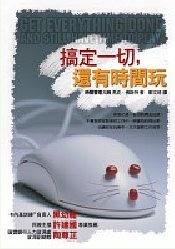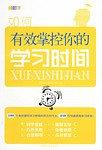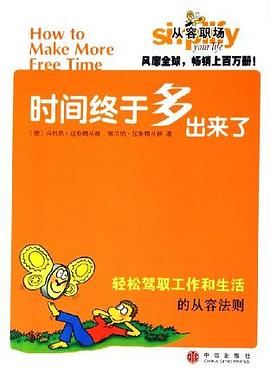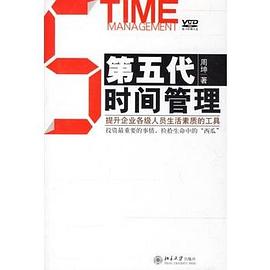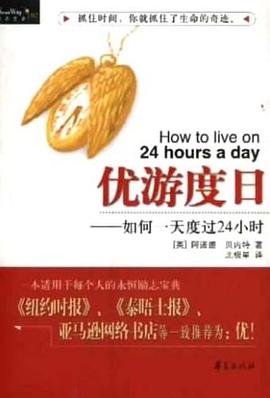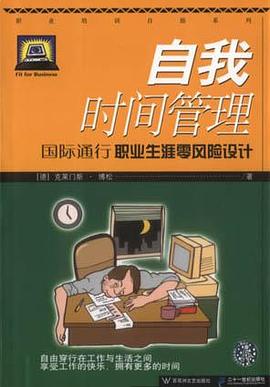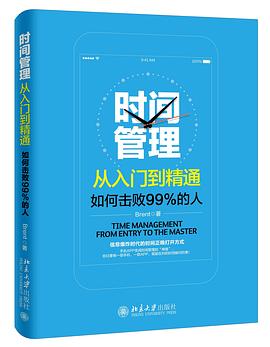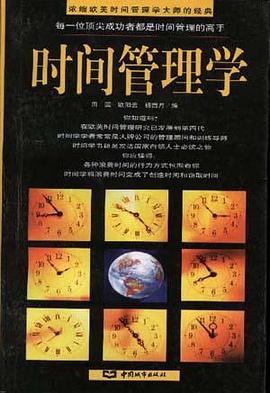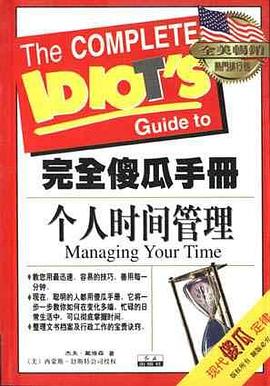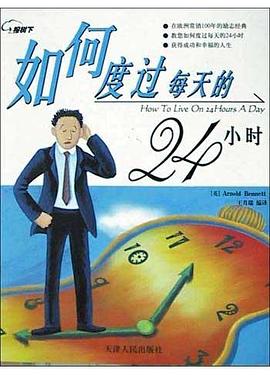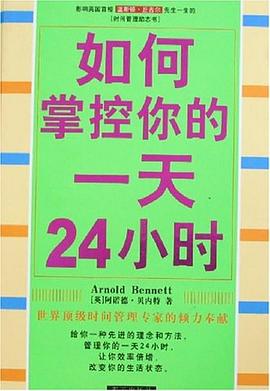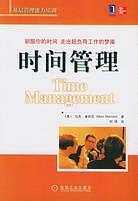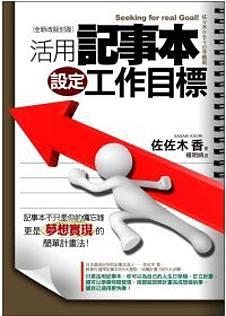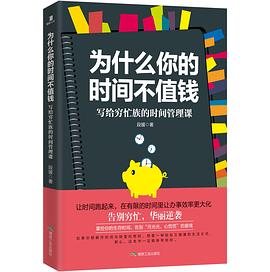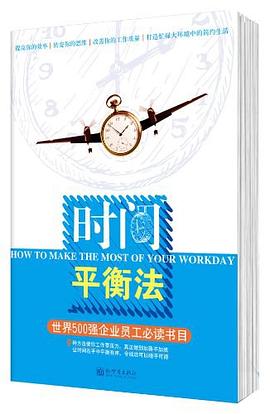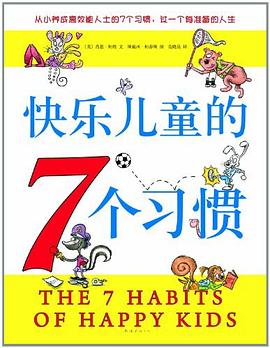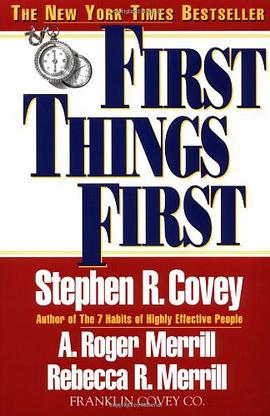

Book Description
I'm getting more done in less time, but where are the rich relationships, the inner peace, the balance, the confidence that I'm doing what matters most and doing it well?
Does this nagging question haunt you, even when you feel you are being your most efficient? If so, First Things First can help you understand why so often our first things aren't first. Rather than offering you another clock, First Things First provides you with a compass, because where you're headed is more important than how fast you're going.
Amazon.com
What are the most important things in your life? Do they get as much care, emphasis, and time as you'd like to give them? Far from the traditional "be-more-efficient" time-management book with shortcut techniques, First Things First shows you how to look at your use of time totally differently. Using this book will help you create balance between your personal and professional responsibilities by putting first things first and acting on them. Covey teaches an organizing process that helps you categorize tasks so you focus on what is important, not merely what is urgent. First you divide tasks into these quadrants:
1.Important and Urgent (crises, deadline-driven projects)
2.Important, Not Urgent (preparation, prevention, planning, relationships)
3.Urgent, Not Important (interruptions, many pressing matters)
4.Not Urgent, Not Important (trivia, time wasters)
Most people spend most of their time in quadrants 1 and 3, while quadrant 2 is where quality happens. "Doing more things faster is no substitute for doing the right things," says Covey. He points you toward the real human needs--"to live, to love, to learn, to leave a legacy"--and how to balance your time to achieve a meaningful life, not just get things done.
--Joan Price
From Publishers Weekly
This is the latest time-management book from the author of The 7 Habits of Highly Effective People.
From Library Journal
Covey ( The Seven Habits of Highly Effective People , LJ 3/15/90) and Roger and Rebecca Merrill here create a new paradigm for taking control of busy lives. Unlike the dozens of self-help books that focus on the clock or the way people spend their time, they offer a "principle-centered" approach to time management that emphasizes what "represents our vision, values, principles, mission, conscience, direction--what we feel is important and how we lead our lives." The authors argue that central to our lives are "four needs and capacities--to live, to love, to learn, to leave a legacy." The ideas here are not only clearly explained but are reinforced by scenarios from the authors' lives and self-directed activities for the reader. Introspection and self-reflection play a larger role here than in most time management books. Highly recommended for all types of collections. Previewed in Prepub Alert, LJ 5/15/93.
- Jane M. Kathman, Coll. of St. Benedict Lib., St. Joseph, Minn.
From Booklist
Time management isn't enough, say Covey and his co-authors, Roger and Rebecca Merrill. But it's an effective starting point, so first lay out your life in four quadrants labeled urgent, not urgent, important, and unimportant. That is, a task may have a deadline, but not much importance; or a task may be important, but require preparation and planning. You should stop doing what's unimportant and without urgency. Where the important and the urgent intersect is where you need to expend most of your energies. Assuming that urgency announces itself, the real question is knowing what's important, and Covey and the Merrills draw from a variety of sources to guide you toward determining just that. Much of their argument goes beyond the linear time of time management and centers on quality time; to properly prioritize and spend one's moments happily and productively, one sets goals--or principles--from which all else flows. These goals embody a perfect balance of the mental, the physical, the spiritual, and the social--that is, you need a challenging job, you need to exercise, you need a system of beliefs, and you need someone to love you. Covey, whose The Seven Habits of Highly Effective People has sold 4,000,000 copies, with the aid of the Merrills again offers common sense for those who are working like dogs and, in the bargain, living dogs' lives.
John Mort
Book Dimension :
length: (cm)21 width:(cm)14
具體描述
讀後感
这书里头有黄金,但是找出来费劲,因为结构太乱,东一榔头西一棒槌,掺杂了很多科维的其他东西,比如影响圈和关注圈、dependent=>independant=>codependent等理论。要有看完了糊里糊涂的准备。 真正的脉络如下: 先想明白自己想成为一个什么样的人,写出一份人生宣言。 根据...
評分目标有了,具体事情也做了,努力了,汗水了,可是得到的却不是自己真正想要的。这究竟是为什么?为什么呢? 要事第一从某种角度给我们作了解答:因为你在行进过程中失去了方向! 作为本书的核心比喻,时钟和罗盘,我们清楚,想要到达彼岸,除了现在就要出发,还要带上罗盘!...
評分It is so good a book through which I learned a lot: (1)The key to quality of life is in the compass--it's in the choices we make every day. As we learn to pause in the space between stimulus and response and consult our internal compass, we can face...
評分 評分上完7 Habits的培训后,一直以为Habit 3: First thing first是关于时间管理。这次,从头到尾看了一遍,发现有被Covey这老头耍了。 First thing first其实是打着时间管理的幌子的个人管理的书。掰来掰去,还是Covey关于价值观的书。真正时间管理的部分,不到1/3就说完了。后面...
用戶評價
this book is a gift that God sends me!
评分將時間管理作為一個課題來研究,這是沒什麼問題的,輸齣的理念也沒有錯誤,簡單來說,就是做減法,不是效率高瞭,就覺得事情都可以完成瞭,而是隻做重要的事情,很對。但是這麼大部頭就為瞭說一個理念,對我來說,太沒有意義瞭。
评分The first audio-book anyway. Visions and Missions, Roles, "Find the Q-2 Goals in each role."
评分this book is a gift that God sends me!
评分Our greatest joy and our greatest pain comes in our relationships with others...
相關圖書
本站所有內容均為互聯網搜索引擎提供的公開搜索信息,本站不存儲任何數據與內容,任何內容與數據均與本站無關,如有需要請聯繫相關搜索引擎包括但不限於百度,google,bing,sogou 等
© 2025 qciss.net All Rights Reserved. 小哈圖書下載中心 版权所有

